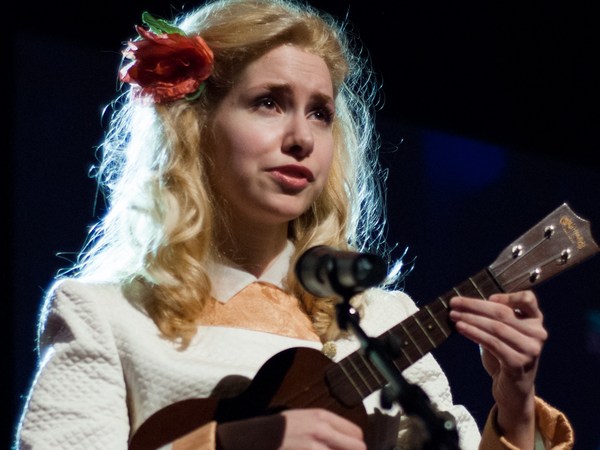Maria Frota: I’m Maria, I’m nine years old, and I’m very worried about excessive cellphone use,
not only by children, but also by teenagers and adults. Juliana Ázara: Hi, I’m Juliana, I’m ten years old, and I believe we need to raise awareness about cellphone use. MF: We’d like to know who in the audience has a cellphone. Raise your hand. Wow! Everybody! So this presentation is for you JA: You’re probably asking yourselves why two nine- and ten-year-old girls would talk about this topic. I already have a cellphone. MF: I don’t, but I really want to get one. JA: Am I using my phone correctly? MF: Why didn’t my parents give me one? JA: What’s the problem with cellphones? MF: We resolved to learn more about it, so we studied and interviewed some friends to understand, in real life, the good and bad sides of cellphone use. We don’t want to use big words as do many adults on internet. We’d like to talk in a way that makes sense for us. JA: Here we go MF: Look at this survey. JA: This survey was done by the “Comitê Gestor da Internet.” 89% of the children between nine and 17 years old are connected with their mobile devices. 43% of those have suffered discrimination based on race, likes, or appearance; 31% were treated offensively; and 21% have taken up strategies seen online to lose weight. MF: Sometimes I get confused reading information using percentages. Are you also confused? Let me explain it another way. Out of every 100 kids, 89 have a cellphone, and out of every 100 kids who have a cellphone, 43 had already been discriminated against, 31 have been treated offensively, and 21 have already tried to lose weight using strategies they saw online. That’s a lot! Everyone here has a cellphone. How many of you have already suffered too? JA: I wonder if children realize situations of discrimination as soon as they happen? I wonder if we can understand that we’re being offended? Do we know how to react? Do we recognize the danger? MF: Do you know that the part of our brain responsible for behavior and emotions will only be totally developed when we’re 25 years old? JA: Does this mean we’re not mature enough to understand everything on our phones? MF: Do you know that our friends have already received photos of naked people on WhatApp? Well, we’re only 10 years old. We can think something that’s wrong is funny, only we don’t really know what the truth is. There are people who believe the crazy diets and mean comments, and they feel really bad, nervous, and sad. Research shows a lot of time spent on the cellphone causes spinal problems, headaches, difficulty sleeping, and myopia. JA: Have you noticed that today there are more kids wearing glasses? MF: To lower the chance of having myopia, which means difficulty seeing distances, we should pause after every 20 minutes of cellphone or computer screen time and do outdoor activities. JA: I, for example, take skating lessons. MF: I’m cycling for volleyball. And you? JA: So let’s show you the questions we asked in our interviews and the most interesting responses. All the interviewees were between nine and ten years old. Half of them had a cellphone, and the other half didn’t. MF: The first question we asked in our interview was: “Do you have a cellphone?” Those who did were asked the following questions: “How long have you had it? How many hours do use it per day? Is there a time limit? Do you adhere to the agreed time limit? Do your parents watch what you do? If they do, what do you think of this? Does your cellphone harm you in some way? What do you think could be dangerous about cellphones? Do you have WhatsApp? Do you participate in groups? If someone spoke badly to you in a group, how would you feel? How would you react?” Those that didn’t have a cellphone were asked: “Would you like to have a cellphone? Do you know why your parents won’t let you? What do you think of this? Do you use some other type of electronics? What do you think can be dangerous with cellphones? Can you give two examples?” These are some of the responses that they gave us: “My parents don’t let me have a cellphone because they don’t think I’m responsible.” “They think I’m not old enough.” “I use it three hours per day.” “I don’t use it every day. I can’t use it after 8:00.” “If they spoke badly about me in a group, I would tell the person that I was sad about the comment and leave the group.” “I talk with friends on WhatsApp, play, and watch YouTube.” “I think it’s good they watch what I do because I can be doing something wrong without knowing it.” Let’s say some of the dangers that our friends responded, but clearly, there are many others: Being hacked, believing in false accounts, downloading pirate applications, scams involving money, talking with strangers, diminishing attention to studies. JA: Do you know what we realized? We realized from our studies and interviews that we thought we’d be talking more about cellphone use, talking among ourselves, talking with our parents, and talking more about what is right and wrong. MF: We kids need to understand that we have a time limit. We can’t talk with strangers, nor believe what we read. There are many lies in WhatsApp groups. It’s like it’s a fake-news factory. JA: While we are studying, we need to put the cellphone away. This helps you pay more attention to the subject. The farther away, the better - you’ll be too lazy to pick it up, and you’ll continue studying. MF: Adults have to understand they can’t give their child the cellphone every time they cry or to distract them during restaurant meals. Studies show that kids should only have a cellphone after they’re 12, and social media access after they’re 13. But we know there’s more to it. We need our parents’ example. Many spend lots of time on electronics and don’t give their kids attention. Later, they ask the kids not to become addicted. JA: Do you know that a child’s chances of being addicted to TikTok are very high? Watching many videos at once gives us such a good feeling that we don’t want to do anything else. MF: And studies show that the amount of time spent on social networks is directly proportional to life dissatisfaction and depression. That is to say, the more time we spend on social networks, the sadder we become. Let’s propose a challenge. I mean, it’s not really a challenge. It’s only to prove this presentation isn’t an adult conversation so that kids will use the cellphone less. When you go to the restaurant with the family, spend a a moment looking around. You’ll see more than one table where everyone will be using electronics and not interacting with each other. You don’t need to go to their table to tell them, “This is wrong.” Just don’t do the same as you set an example. The cellphone is very important for us to communicate, for security, to know where we are, and to make life better in many ways. But we can’t push away the people around us. We need to use it with responsibility. We made this presentation to talk about the good side and the bad side of cellphone use, and we realize that kids already have enough responsibility for the dangers, but we need to talk with our parents about adequate use for our age. Closing this presentation, we can’t conclude the ideal age for someone to get a cellphone, and we close with one great certainty: We need to talk about digital education. MF and JA: Thank you for your attention. (Applause)





